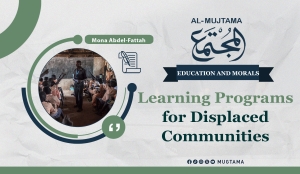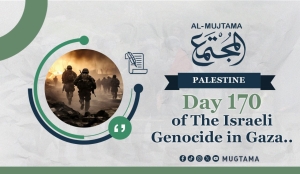Learning Programs for Displaced Communities
February 09, 2025Education in displacement camps faces a significant and difficult challenge in countries and regions afflicted by wars or natural disasters, such as Gaza, Syria, Yemen, Sudan, and Lebanon, especially after the severe damage inflicted on educational infrastructure.
Students are forcibly absent from education at all levels due to the lack of conditions that would enable their return to formal education. Schools have been converted into shelters, many students and teachers have lost their lives, and basic services like electricity and the internet are frequently unavailable.
In light of this dire reality, the issue of returning displaced children to the classroom imposes itself as a critical topic of discussion. There is an urgent need for international efforts and community solidarity to halt the deprivation of education and ensure at least a basic level of learning to protect the new generation from the dangers of illiteracy and ignorance.
There are real-world efforts aimed at dealing with this situation with flexibility and resilience, such as educational tents for children in Gaza. These tents provide remedial classes in reading, writing, and mathematics for children after more than 90% of the schools in the area were damaged by ongoing bombings, according to the United Nations Relief and Works Agency for Palestine Refugees (UNRWA).
Other applied solutions include offering remote learning systems, as was done in Lebanon during its war with the Israeli enemy, and implementing free accelerated education programs supported by UNICEF.
"Accelerated education" relies on a series of academic curricula that children need to pass before their eligibility for formal education is evaluated. This includes teaching basic skills in reading, writing, and arithmetic.
In Syria, the absence of school textbooks posed a significant challenge to the educational process. However, a notable initiative launched by Qatar Charity years ago played a crucial role in creating a conducive environment for encouraging children to return to school, particularly in northern Syria. The organization printed over 9 million textbooks covering all core subjects for all stages of basic education, benefiting more than a million students.
Meanwhile, Egypt plays a major role in trying to provide Sudanese refugee children with the right to education through alternative schools and educational centers supported by the United Nations High Commissioner for Refugees (UNHCR). It also hosts Sudanese certificate exams for primary, middle, and secondary stages in Egyptian schools.
A pioneering experience is being carried out by the Istanbul-based organization "Ghiras Al-Khair," which offers programs to sponsor teachers in displacement areas. It provides monthly salaries for teachers and equips them with essential educational tools while working on improving the educational environment for displaced children.
In this context, Karen Mundy, Director of UNESCO's International Institute for Educational Planning, advises preparing crisis response and recovery plans, training teachers to work under difficult conditions such as displacement, and supporting educational systems during crises.
Specialized Curricula
A recent study titled "Educational Needs of Refugee Students in Educational Institutions in Egypt" emphasizes that education preserves refugees' lives, grants them the right to a future, and enables them to become good citizens in the host country and later in their homeland. It also makes them active elements in peace-building and not tools for war, thereby enhancing conflict prevention, facilitating post-conflict transitions, and ensuring successful reconstruction.
UNICEF has developed what it calls the "Emergency Curriculum" for displaced and refugee children, which provides a condensed curriculum focusing on four subjects: Arabic, Mathematics, Science, and English.
Educational experts stress that such curricula should promote integration by offering social, linguistic, and cultural support, fostering interaction between displaced persons, refugees, and the host community, while respecting cultural and social differences. They should also work towards increasing adaptability to new circumstances and improving opportunities for learning, work, and integration.
However, the needs of displaced and refugee communities, particularly in areas that suffered repression (Syria as an example) or genocide (Gaza as an example), require specialized, conscious, and mature curricula. These must address the psychological insecurity experienced by displaced individuals while also providing intellectual nourishment in response to their questions about the suffering they endure, whose effects may last for decades.
It is crucial to develop tailored educational content for students in such regions that reinforces national identity, pride in the homeland and holy sites, and the values of patience and perseverance. This content should protect children from despair, instill courage and heroism, and prepare them for rebuilding their countries after the wars.
Investing in the children of these countries after the wars requires a deep understanding of their suffering, needs, and goals, as well as how they aspire to build a new nation and preserve the gains of revolutions or victories. It also involves acknowledging their sacrifices and guiding their efforts toward planning, building, and managing their future.
These curricula must necessarily stop distorting history, eliminate historical inaccuracies, and halt the misrepresentation of resistance. They must also restore the rightful place of early Muslim history, the life of the Prophet Muhammad (peace be upon him), and his companions, instill love for Al-Aqsa Mosque in students' hearts, educate them on their duties toward the homeland, and teach them the reality of the conflict with the Zionist enemy while establishing resistance as a strategic option for liberating Palestine.
Furthermore, these curricula should promote the spirit of consultation (shura), freedom, democracy, acceptance of differing opinions, and rejection of injustice, exclusion, oppression, sectarianism, and racism—issues deeply rooted by dictatorial regimes, occupying governments, and Western organizations promoting ideas and values that contradict Islamic principles.
-------------------------------------------------------------
Day 170 of the Israeli Genocide War on Gaza
March 25, 2024Targeting Hospitals and Civilians
On the 170th day of the Israeli aggression on the Gaza Strip, hospitals and medical teams are still being targeted by the occupation forces. According to government media in Gaza, 5 doctors and nurses were executed, and 350 civilians were killed in and around the complex.
New Military Operation
At the field level, the occupation forces announced a new military operation west of Khan Yunis. The resistance claimed to have inflicted losses on soldiers and vehicles.
Massacres
The Israeli occupation committed 8 massacres in the Gaza Strip in the past 24 hours, resulting in 84 deaths and 106 injuries. The total number of casualties since October 7 is 32,226 dead and 74,518 wounded.
Arrests in the West Bank
Between last night and today, at least sixteen Palestinians from the West Bank—among them a newborn and a former prisoner—have been captured by Israeli soldiers. Israeli soldiers and Palestinians clashed at a number of locations. There were more than 7,755 inmates in custody as of October 7.
Banning UNRWA Convoys
The UNRWA Commissioner-General said that Israel will no longer allow meals convoys to the northern Gaza Strip, hindering life-saving useful resource. The US Congress' selection to freeze UNRWA's investment will impact get entry to food, refuge, health offerings, and training for Palestinian refugees.
Hezbollah Attacks
Hezbollah in Lebanon targeted Israeli websites in the south of the country, resulting in deaths. According to Israeli media, missiles are launched toward the Golan Heights from Lebanon.
Worldwide Calls
The Secretary-General of the United Nations pleaded with Israel to make it easier for supplies of relief to reach Gaza while averting a humanitarian catastrophe. The Jordan Valley land theft by Israel was denounced by the European Union.
Global Reactions
Both French President Macron and US Vice President Harris issued advisories about comparable military operations in Gaza. Israeli officials are experiencing grievances over how they handled the conflict.
European Demonstrations
Demonstrations in European towns show unity with Palestinians and call for an instantaneous ceasefire. Israeli public international relations are beneath scrutiny, with blame located on Prime Minister Netanyahu.
-----------
Agencies



